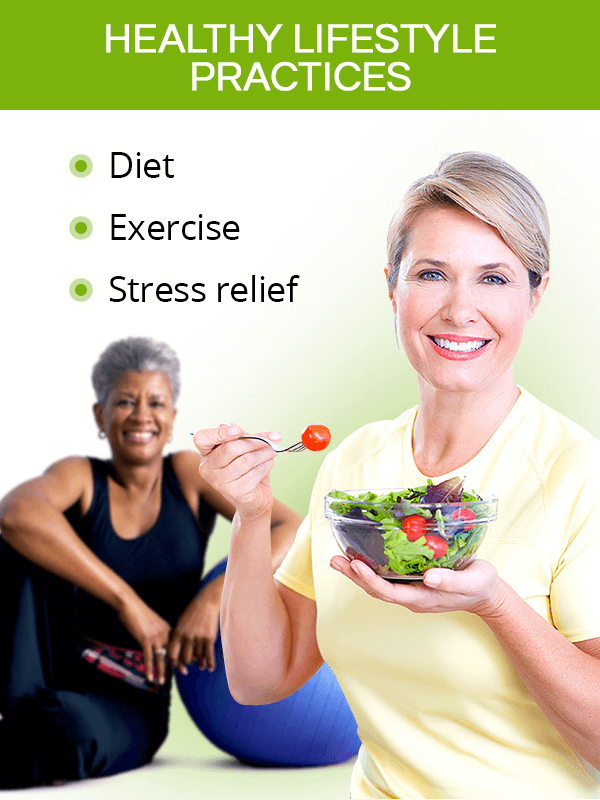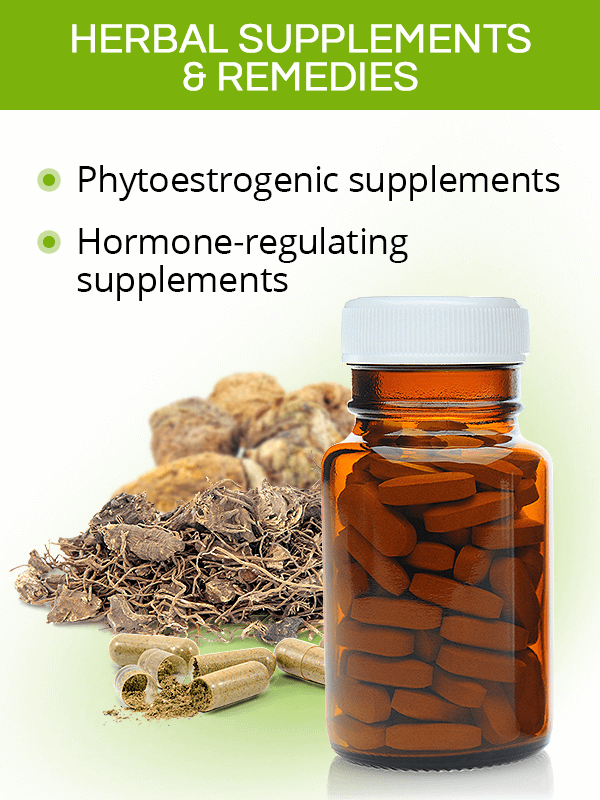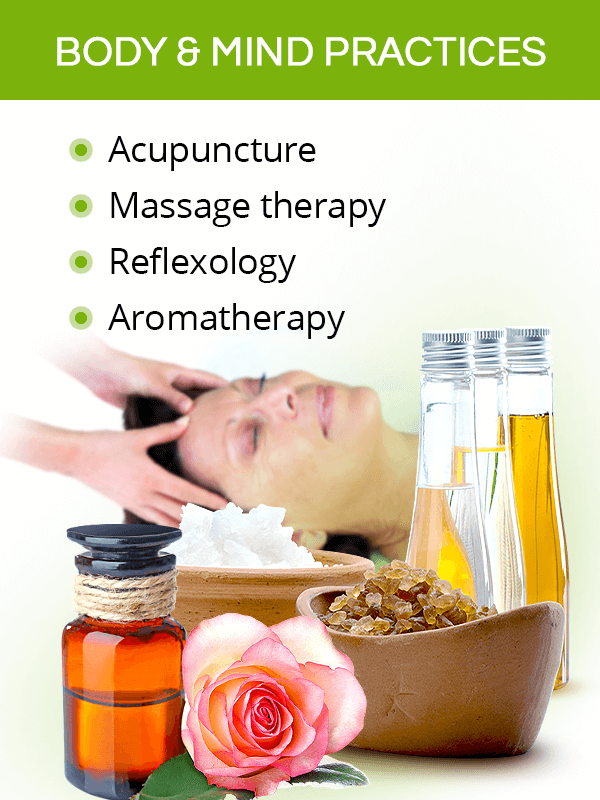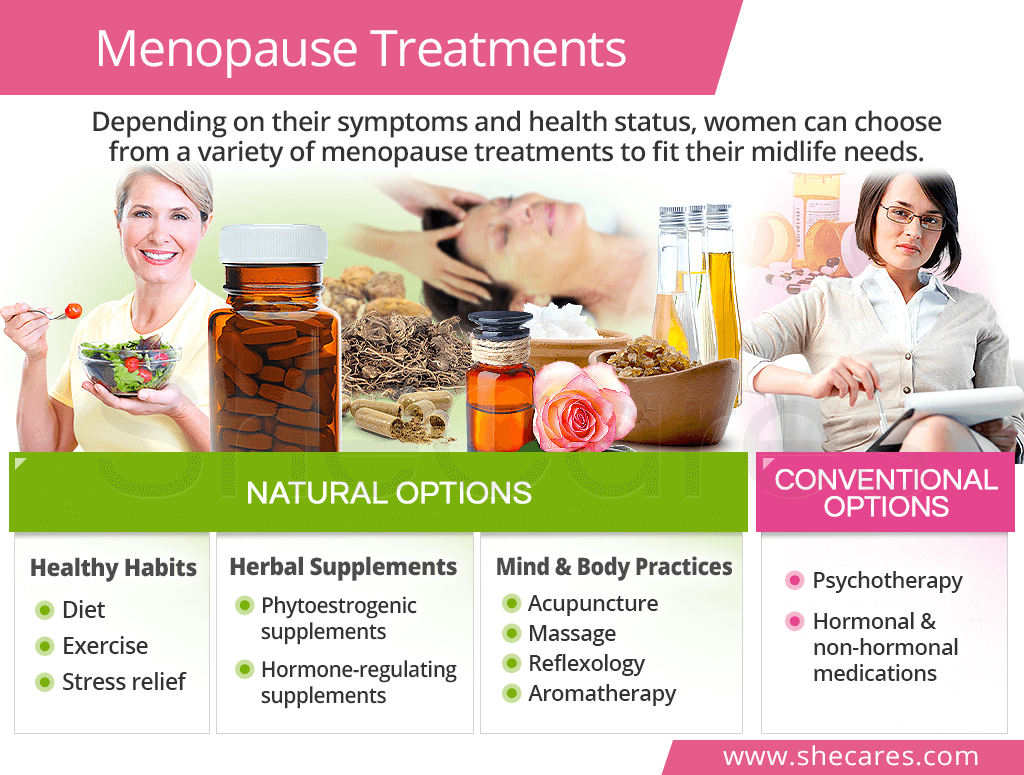Healthy Lifestyle Practices

When plagued by menopause symptoms, it may be tempting to disregard healthy habits as being of secondary importance. Yet, research shows that implementing wholesome lifestyle changes is one of the best menopause relief approaches.
Such modifications can be as simple as taking a closer look at three aspects of a daily lifestyle: what does a woman eat, how much does she move around, and how does she relieve stress.
Menopause diet. A nutritious meal plan for menopause symptom relief should include balanced amounts of complex carbs, healthy fats, and lean protein as well as vitamins and minerals, including calcium. Phytoestrogenic foods, such as soy and flax, are also worth adding as they can help ease symptoms of hormonal imbalance.
Menopause workouts. A well-designed exercise plan can be effective for managing weight gain, boosting mood, reducing the risk of menopause heart disease, preventing osteoporosis, and more. Women should opt for moderate cardio (150 minutes per week), strength-training (at least twice a week), and balance exercises (a few minutes daily).1
Menopause stress relief. While menopause is known to be stressful, letting stress accumulate in the body can further worsen hormonal imbalance, triggering symptoms and increasing the risk of menopause problems. Stress-relieving ideas include exercising, meditation, spending time in nature, and improving sleep quality.
Herbal Supplements & Remedies

As a complement to healthy habits, women can take advantage of the medicinal properties of various herbs for menopause. The good news is that modern science continues to validate safety and efficacy of many of these herbal remedies.
Medicinal herbs to treat menopause symptoms can be taken in a variety of forms, such as inhalations or herbal infusions. However, the most popular form of consumption are herbal supplements. Two types worth considering are:
Phytoestrogenic supplements, such as black cohosh, are great for short-term use. They contain estrogen-like compounds, called phytoestrogens, which are found in over 300 plants.2 By mimicking estrogen functions, these supplements can ease hormonal fluctuations, helping relieve menopause symptoms, like hot flashes.
Hormone-regulating supplements, such as Macafem, are an excellent choice for long-term relief. Their nutrients nourish the body's hormone-producing glands and improve their function. As a result, these supplements can safely treat menopause symptoms, like loss of libido and mood swings, without supplying the body with outside hormones.
Body & Mind Practices

Another natural way to relieve symptoms includes a variety of body and mind practices. Oftentimes dating back to ancient times, many have already been put to the test in clinical trials with great results.
Whether used as complementary or alternative therapies for menopause, these body and mind practices can address both physical and psychological discomforts middle-aged women face. The most common, science-backed options include the following:
Foot reflexology involves pressing certain body points to stimulate healing in the corresponding body organs. It can relieve depression as well as vasomotor symptoms, like night sweats.
Acupuncture also stimulates various points on the body, but with the help of thin needles. It may be helpful for sleep disorders, allergies, anxiety, and overall life quality improvements.
Massage therapy is an effective way to relax muscle tissue, reduce inflammation, and reduce pain. As such, it can help relieve menopause symptoms, such as muscle weakness, urinary discomforts, painful sex, and more.
Aromatherapy uses essential oils extracted from plants to promote physical and emotional well-being. It may help women tackle their sleep issues, headaches, depression, and knee pain, among others.
Meditation & breath work are two of the best ways to bring tranquility into one's mind, release stress, and improve overall outlook on life. They can also help manage mood swings, irritability, panic attacks, and insomnia.
Conventional Treatments

Menopause symptoms treatment can also include more conventional approaches. Since pharmacological treatments generally cause considerate side effects, they may not be a worthwhile option for all women, unless medically indicated.
There are two conventional ways to treat menopause symptoms: psychotherapy and menopause medications:
Psychotherapy. While most women generally associate psychotherapy with improvements of psychological nature, it can help treat physical discomforts as well. Studies have shown that cognitive-behavioral therapy can relieve vasomotor symptoms, sleep issues, and sexual problems in menopausal women.3
Medications. Whether a woman will need prescription medications will depend on her symptoms' severity and health status. They include risky hormonal options, like hormone replacement therapy (HRT) and bioidentical hormone replacement therapy (BHRT), and less risky non-hormonal options, tailored to specific symptoms.
It is key to keep in mind that HRT in particular has been associated serious side effects and increased health risks, like heart disease and cancers, some of which may persist for over 10 years once treatment has ended.4 As such, it is mainly used short-term for severe symptoms and serious health risks.
Key Takeaways
At their entry into the menopausal transition, women may be overwhelmed not only with symptoms they experience, but also with finding reliable information about the treatment options they have. Luckily, relieving menopause symptoms can be done through a wide range of approaches, depending on women's preference, dedication, and health status. The most natural menopause treatment includes making healthy lifestyle choices (e.g., through diet, exercise, and stress relief techniques); taking herbal supplements (e.g., phytoestrogenic and hormone-regulating supplements); and employing various body and mind practices (e.g., acupuncture and reflexology). More conventional menopause treatments, on the other hand, involve psychotherapy as well as medications (e.g., HRT and non-hormonal options). Many should be used cautiously due to their side effects.
Sources
- Academy of Nutrition and Dietetics. (2019). Eating Right During Menopause. Retrieved April 13, 2021 from https://www.eatright.org/health/wellness/healthy-aging/eating-right-during-menopause
- Clinical cases in Mineral and Bone Metabolism. (2007). Phytoestrogens: food or drug? Retrieved April 13, 2021 from https://www.ncbi.nlm.nih.gov/pmc/articles/PMC2781234/
- Harvard Health Publishing. (2020). Can acupuncture help my menopause symptoms? Retrieved April 13, 2021 from https://www.health.harvard.edu/womens-health/can-acupuncture-help-my-menopause-symptoms
- Johns Hopkins Medicine. (n.d.). Aromatherapy: Do Essential Oils Really Work? Retrieved April 13, 2021 from https://www.hopkinsmedicine.org/health/wellness-and-prevention/aromatherapy-do-essential-oils-really-work
- Maturitas. (2011). Mind-body Therapies for Menopausal Symptoms: A systematic Review. Retrieved April 13, 2021 from https://www.ncbi.nlm.nih.gov/pmc/articles/PMC3031101/
- Mayo Clinic. (2019). Mindfulness may ease menopausal symptoms. Retrieved April 13, 2021 from https://newsnetwork.mayoclinic.org/discussion/mindfulness-may-ease-menopausal-symptoms/
- Mayo Clinic. (2020). What is reflexology? Can it relieve stress? Retrieved April 13, 2021 from https://www.mayoclinic.org/healthy-lifestyle/consumer-health/expert-answers/what-is-reflexology/faq-20058139
- National Osteoporosis Foundation. (2018). Calcium and Vitamin D. Retrieved April 13, 2021 from https://www.nof.org/patients/treatment/calciumvitamin-d/
Footnotes:
- American Heart Association. (2021). American Heart Association Recommendations for Physical Activity in Adults and Kids. Retrieved April 13, 2021 from https://www.heart.org/en/healthy-living/fitness/fitness-basics/aha-recs-for-physical-activity-in-adults
- Darbre, P. (2015). Endocrine Disruption and Human Health. Retrieved April 13, 2021 from https://www.sciencedirect.com/science/article/pii/B9780128011393000016
- Menopause. (2019). Cognitive behavior therapy for menopausal symptoms (CBT-Meno): a randomized controlled trial. Retrieved April 13, 2021 from https://journals.lww.com/menopausejournal/Abstract/2019/09000/Cognitive_behavior_therapy_for_menopausal_symptoms.6.aspx
- The Lancet. (2019). Type and timing of menopausal hormone therapy and breast cancer risk: individual participant meta-analysis of the worldwide epidemiological evidence. Retrieved April 13, 2021 from https://www.thelancet.com/journals/lancet/article/PIIS0140-6736(19)31709-X/fulltext
